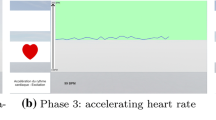Abstract
Like many researchers, we think that the use of dynamic difficulty adjustment (DDA) to offer an appropriate balance between the skills of the player and the difficulty of the gameplay is an appropriate avenue to maintain the flow of a user. We analyze this approach in a virtual reality serious game dedicated to people suffering from post-traumatic stress disorder (PTSD). Knowing that heart rate is a good indicator of the emotional state of people with PTSD, we collect this variable in real-time to propose a virtual reality dynamic adjusted system based on the emotional state of the subject. The proposed adaptation system can be approached in three modes: the offline mode which consists on therapist selections before launching the game, the manual online mode during which the therapist can adapt the virtual environment while the subject is exposed, and the computational online mode that runs a DDA algorithm to automatically adjust the game.
Access this chapter
Tax calculation will be finalised at checkout
Purchases are for personal use only
Similar content being viewed by others
References
Menelas, B.-A.J., Benaoudia, R.S.: Use of haptics to promote learning outcomes in serious games. Multimod. Technol. Interact. 1(4), 31 (2017)
Delmas, G., Champagnat, R., Augeraud, M.: Plot monitoring for interactive narrative games. In: Proceedings of the International Conference on Advances in Computer Entertainment Technology (2007)
Hunicke, R., Chapman, V.: AI for dynamic difficulty adjustment in games. In: Challenges in Game Artificial Intelligence AAAI Workshop, San Jose, pp. 91–96 (2004)
Spronck, P., et al.: Adaptive game AI with dynamic scripting. Mach. Learn. 63(3), 217–248 (2006)
Perreira Da Silva, M., Courboulay, V., Prigent, A., Estraillier, P.: Real-time face tracking for attention aware adaptive games. In: Gasteratos, A., Vincze, M., Tsotsos, J.K. (eds.) ICVS 2008. LNCS, vol. 5008, pp. 99–108. Springer, Heidelberg (2008). https://doi.org/10.1007/978-3-540-79547-6_10
Foa, E., Hembree, E., Rothbaum, B.O.: Prolonged Exposure Therapy for PTSD: Emotional Processing of Traumatic Experiences Therapist Guide. Oxford University Press, Oxford (2007)
Rizzo, A., et al.: Virtual reality applications for the assessment and treatment of PTSD. In: Bowles, S.V., Bartone, P.T. (eds.) Handbook of Military Psychology, pp. 453–471. Springer, Cham (2017). https://doi.org/10.1007/978-3-319-66192-6_27
Liu, C., et al.: Dynamic difficulty adjustment in computer games through real-time anxiety-based affective feedback. Int. J. Hum. Comput. Interact. 25(6), 506–529 (2009)
Van Rooij, M., et al.: DEEP: a biofeedback virtual reality game for children at-risk for anxiety. In: Proceedings of the 2016 CHI Conference Extended Abstracts on Human Factors in Computing Systems (2016)
Ninaus, M., Tsarava, K., Moeller, K.: A pilot study on the feasibility of dynamic difficulty adjustment in game-based learning using heart-rate. In: Liapis, A., Yannakakis, G.N., Gentile, M., Ninaus, M. (eds.) GALA 2019. LNCS, vol. 11899, pp. 117–128. Springer, Cham (2019). https://doi.org/10.1007/978-3-030-34350-7_12
Bryant, R.A.: Acute Stress Disorder: What it is and How to Treat it. Guilford Publications, New York (2016)
Wood, D.P., et al.: Combat-related post-traumatic stress disorder: A case report using virtual reality graded exposure therapy with physiological monitoring with a female Seabee. Milit. Med. 174(11), 1215–1222 (2009)
Kengne, K., et al.: Action-centered exposure therapy (ACET): a new approach to the use of virtual reality to the care of people with post-traumatic stress disorder. Behav. Sci. 8(8), 76 (2018)
Lopes, R., Bidarra, R.: Adaptivity challenges in games and simulations: a survey. IEEE Trans. Comput. Intell. AI Games 3(2), 85–99 (2011)
Desai, P.R., et al.: A review paper on oculus rift-a virtual reality headset. arXiv preprint arXiv:1408.1173 (2014)
Menelas, B.-A.J., et al.: Use of virtual reality technologies as an Action-Cue Exposure Therapy for truck drivers suffering from Post-Traumatic Stress Disorder. Entertainment Comput. 24, 1–9 (2018)
Rothbaum, B.O., et al.: Virtual reality exposure therapy of combat-related PTSD: a case study using psychophysiological indicators of outcome. J. Cogn. Psychother. 17(2), 163–178 (2003)
Walshe, D.G., et al.: Exploring the use of computer games and virtual reality in exposure therapy for fear of driving following a motor vehicle accident. CyberPsychol. Behav. 6(3), 329–334 (2003)
Transportation UDO, How Do Weather Events Impact Roads? Federal Highway Administration Washington, DC (2015)
website, American Heart Association. All About Heart Rate (Pulse)
Author information
Authors and Affiliations
Corresponding author
Editor information
Editors and Affiliations
Rights and permissions
Copyright information
© 2020 Springer Nature Switzerland AG
About this paper
Cite this paper
Kamkuimo K., S.A., Girard, B., Menelas, BA.J. (2020). Dynamic Difficulty Adjustment Through Real-Time Physiological Feedback for a More Adapted Virtual Reality Exposure Therapy. In: Marfisi-Schottman, I., Bellotti, F., Hamon, L., Klemke, R. (eds) Games and Learning Alliance. GALA 2020. Lecture Notes in Computer Science(), vol 12517. Springer, Cham. https://doi.org/10.1007/978-3-030-63464-3_10
Download citation
DOI: https://doi.org/10.1007/978-3-030-63464-3_10
Published:
Publisher Name: Springer, Cham
Print ISBN: 978-3-030-63463-6
Online ISBN: 978-3-030-63464-3
eBook Packages: Computer ScienceComputer Science (R0)




